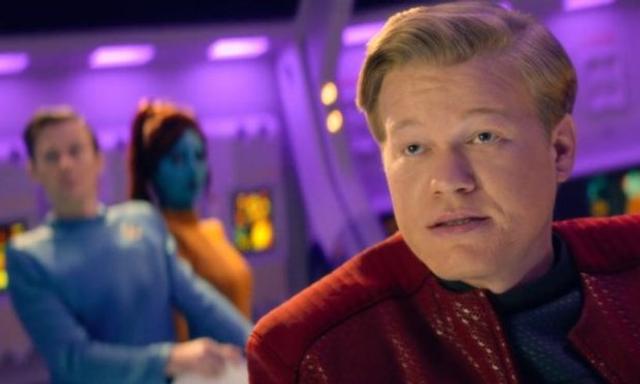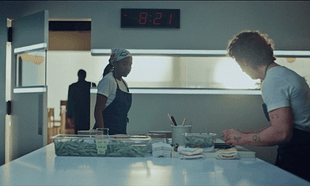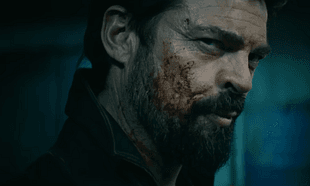One of Black Mirror's greatest strengths is that you often find yourself either trying to second-guess it or unravel the mystery or message behind the premise in the opening few moments. In Black Mirror's fourth season, this seems to have given way to a more forthright approach by creator Charlie Brooker.
Across the six episodes, the twist - if you can call it that - is either explained and acknowledged in the opening five or ten minutes, or it's left until the final moments - but plays no major part in the story itself. But more than this, what Black Mirror's fourth season addresses is not so much the malevolence of technology, but rather the consequences of it. In other words, the future has happened - so how do we deal with it?
In the case of USS Callister, the technology may be groundbreaking - but the kernel is something we see every day. The ever-reliable Jesse Plemons takes on a dual role, one as a nebbish and "starey" technology guru who's largely overlooked in the company he helped to build - and the other in a computer-simulated universe where he's Captain Kirk on a sadism kick. The direction by Toby Haynes smartly balances the real world with its straightforward, almost dull camera work and cinematography with the fantastical, garishly coloured and swooping visuals of the simulation. When Plemons' character decides to add a new crewmember to his ship - which is made up of people who he perceives as having wronged him in the real world - we're introduced to fellow Fargo alum Cristin Miloti, who has one of the best lines in Black MIrror's history - "Stealing my p*ssy is a red f*cking line!" Smart without being smarmy, funny without being lighthearted, and intelligence without being pompous, USS Callister is top-tier Black Mirror.
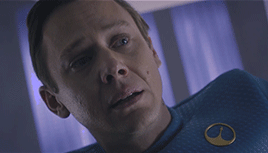
Sadly, this doesn't carry over to Arkangel, directed by Jodie Foster. Taking something that's already been covered before in Black Mirror - the concept of constant surveillance and how it applies to relationship dynamics - here we see a single mother, played by Rosemarie DeWitt, opt to have an implant placed in her daughter's head that will give her complete access to what she sees - and, more pointedly, the ability to block out anything that is deemed to be inappropriate. As mentioned, the rub of the episode is made clear pretty quickly; namely, that blocking out the experiences - whether good or bad - can make a child less able to cope with the reality of life. The show then shifts gears into a coming-of-age drama, where Dewitt's on-screen daughter matures to her teenage years and becomes more precocious. Again, the episode goes in exactly the direction you'd expect it to go, but the difference here is that by the time the conclusion rolls around, you don't come away with anything you haven't already understood or acknowledged at the very start. Still, Dewitt's performance is layered and Foster's direction is capable and smartly opts for a much natural approach than any other episode in the series.
Although it does have a technological vein running through it, Crocodile could easily remove this it and act as a Scandi-noir pilot all by itself. Directed by John Hillcoat and starring Andrea Riseborough as an architect who's desperate to keep a shameful secret hidden, the episode follows her as she tries to murder her way out of it - all while maintaining a veneer and calmness that it is utterly horrifying, but baffling when you see how implausible her actions are. Maybe it's partly about how appearing calm and collected, even if you're doing something than anyone else can see is patently stupid, but whatever it is - Riseborough does it in a truly convincing way. Kiran Sonia Sawar, meanwhile, plays an insurance investigator whose parallel story eventually crosses over into Riseborough and gives it a warmth and humanity, playing off nicely against Riseborough's detachment. As a whole, the episode works, but the conclusion does feel a little hokey and not nearly as satisfying as it should have been.
While it may be easy to compare Hang The DJ with last season's San Junipero, there's less of that episode's sweetness here. Instead, Hang The DJ acts more as an investigation into the nature of relationships, and whether the conveyor-belt style of dating is either about breaking down your expectations and hopes, or if it's just about finding the right one. Like USS Callister, there's a lot of humour to be had in the episode and a lot of this comes from both the two leads - Georgina Campbell and Joe Cole - and Brooker's writing. The System, as it's referred to, guarantees that you will be matched with your Ultimate Compatible Other - but, as the episode progresses, it becomes clear that both leads are as lost without each other. It offers a fascinating look at modern dating and sex, and whether or not the belief in monogamy is warranted - but ends in a final scene that feels just a bit lazy.
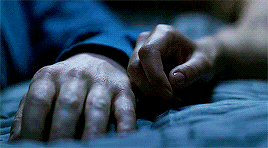
From there, Metalhead presents itself as a forty-odd minute thriller with no context, no gimmicks and nothing in the way of commentary. David Slade's decision to film it entirely in black and white was to both harness the oppressive nature of it, but also allows us to hone in more on the characters - and really, Metalhead is a two-hander between Maxine Peake and the nameless, Boston Dynamics-inspired creature that's hunting her. Stripped back and honed like a sharp knife, Metalhead rips through its running time with a breathlessness to it that is unlike any other Black Mirror episode yet seen. It's by far the most audacious entry of the series since San Junipero - in that it subverts what you expect of Black Mirror - and makes for something else entirely. Peake gives an incredible performance; you really feel the exhaustion and the fact that she ably carries the whole episode just proves what a talent she is. Slade knows how to make a stripped-back thriller; his feature-length debut was the disturbing Hard Candy with Ellen Page and Patrick Wilson, and that economic approach works wonders here. Quick and vicious, Metalhead is Mad Max meets Wall-E by way of Meshuggah.
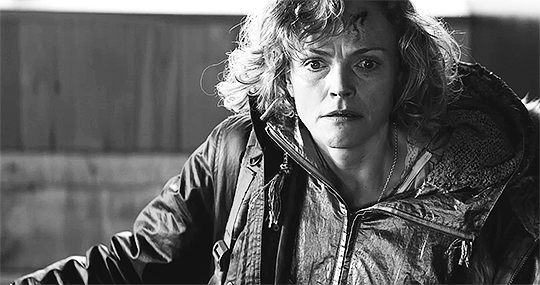
Black Museum is an interesting one, in that the concept feels like it was a way for Charlie Brooker to stitch together a number of lingering ideas he's had into one episode. More interesting, however, is that the episode feels like it's an acknowledgement of the theory that Black Mirror exists inside a self-contained universe. There's references to previous episodes, such as White Bear, San Junipero, Hated In The Nation, White Christmas, but more pointedly is how the sweaty, oily owner / proprietor - played by Douglas Hodge - has preserved these and recounts their horrific histories with glee to Letitia Wright. Each exhibit in the titular museum has a diverting enough story that works well in context, but it seems clear why none of them were explored fully as standalone episodes. Moreover, the constant narration from Hodge's character gets tiresome in parts, but helps to make it more concise. For the most part, Black Museum breezes along and the conclusion of the story feels signposted and obvious - a lot like the exhibits in the museum itself. It works and it's fine, sure, but does it have the same impact of seeing in context and in comparison with previous efforts? Not so much.
Overall, the fourth season of Black Mirror is by far the most hit-and-miss. It's certainly lacking for imagination or inventiveness, and the likes of Metalhead and USS Callister more than proves that Brooker can fashion a thoughtful and unique experience out of a singe-line premise. While it may not be as slam-dunk as the third season, there's still plenty here to enjoy.
